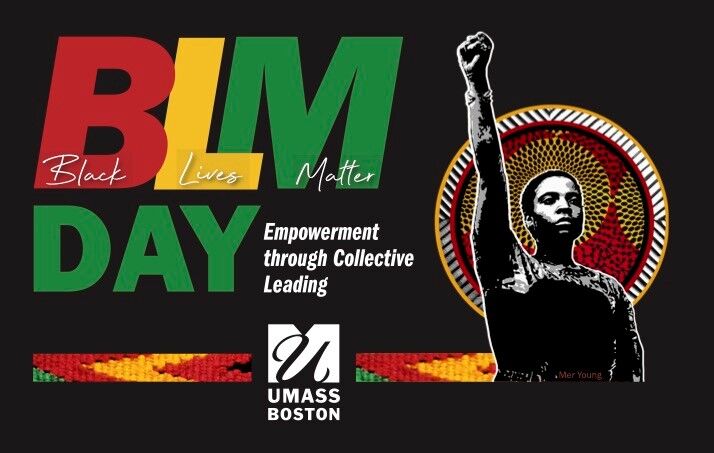On Nov. 1, UMass Boston held its second annual Black Lives Matter Day. The events of the day included breakout sessions with community leaders, a panel and a keynote address, as well as a mural and memorial presentation and call to action. The event was open to all.
Students, faculty and staff were able attend individual events or the entire BLM Day. Events took place in the Campus Center Ballroom, and participants were able to attend in person or stream the events live. Breakout sessions were in-person only.
Dr. Joseph Cooper, Special Assistant to the Chancellor for Black Life and Chair of the Black Lives Matter Day Planning Committee, led the event organization.
“The university recognizes that we celebrate all humanity, but we also recognize that groups are affected by oppression in distinct ways,” said Dr. Cooper via Zoom when asked why it is important to celebrate BLM Day at UMass Boston. “And so, celebrating Black Lives Matter [Day] uplifts the humanity of Black people, and it communicates that the unjust deaths that have taken place are not in vain—that we will stand against injustice, that we will unapologetically stand in solidarity with the Black Lives Matter movement as it relates to the empowerment and the human rights of people who identify as Black, and that we understand that the movement does not end; that we are a part of an intergenerational movement for human rights for all people”
Dr. Steve Neville, Assistant Vice Chancellor for Student Affairs and a member of the planning committee for BLM Day, spoke to why BLM Day is important for students specifically.
“I think students are deeply and profoundly hurt by the slate of killings and brutality that have been experienced by Black women and men—Black people—over the centuries that we’ve been in the United States—that it [the brutality] continues, and the way that it does over and against claims to change and progress having taken place is problematic,” said Dr. Neville via Zoom.
Dr. Neville also spoke to how this year’s BLM Day will compare to last year’s.
“This year, given that we’re open and we’re back on campus, technically speaking, it’s allowed us to be able to connect with people in the larger community,” said Dr. Neville. “Many of the speakers this year are people who are doing some very interesting and powerful kinds of things in the community outside of UMass Boston, and that’s something that I think is important to me, as an administrator of the university. If we’re going to be Boston’s public research university, we have to find ways to engage in more significant ways with people and institutions in and around the community.”
Dr. Cooper spoke to the importance of bringing members from outside of the UMass Boston community into BLM Day as well.
“We work better when we are connected, when we share information, and when we work alongside one another, as opposed to in silos, and competing with one another,” said Dr. Cooper. “So it’s really important on a symbolic and a substantive level for UMass Boston to affirm its commitment to the broader community in which we are located. We are not separate from the community, we are a part of the community.”
The theme of the event this year was “empowerment through collective leadership,” which Dr. Neville spoke to as well.
“It’s kind of this notion of where I’m strong you’re weak, and where I’m weak, you’re strong, and we get the job done together,” said Dr. Neville. “I think that’s a very powerful approach and form to leadership.”
Dr. Cooper spoke to the mural and memorial presentation that occurred.
“The artist who did the mural last year will actually be coming back and adding to the mural […],” said Dr. Cooper. “[The] new additions to the mural […] [are] a very poignant and very powerful testament to the movement and the purpose of the movement.”
At the beginning of October, the Black Student Center held a protest demanding accountability from the university when racist hate speech was written in a couple of classrooms on campus. The Mass Media asked Dr. Cooper, who attended the protest as a representative for Chancellor Marcelo Suárez-Orozco, how BLM Day would distinguish itself as a non-performative anti-racist event.
“If you look at the topics that we’re covering, I [would] argue that those topics are not performative at all,” said Dr. Cooper. “Those topics are very serious; they in many cases are a matter of life and death. So the topics that we’re covering are not performative. All of the people who are a part of the program have a history and a documented record of engaging in serious work to address racial inequities within their respective spheres of influence, so I don’t think that that’s performative at all.”
Dr. Cooper also mentioned how people who may not be willing to join a protest or take a course in a certain area may be willing to educate themselves through the BLM Day event.
“Will this single event transform the university altogether?” asked Dr. Cooper. “Absolutely not. But I would argue that no one course, no one event, no one program will do that. It’s a collection of efforts, including the student protests that are a part of a larger conversation and a larger collective effort to help the university be the best that it can be.”
When the Mass Media reached out to the BSC regarding their perspective on BLM Day via email, the BSC replied that the event is mostly faculty driven, and that there was not much that students could say about the event that staff would not be able to. When asked for further comment, the BSC did not respond.
BLM Day was founded last year by Pilar Nelson, Community Director of the Office of Housing and Residential Life, who also served on the BLM Day planning committee this year.





















































